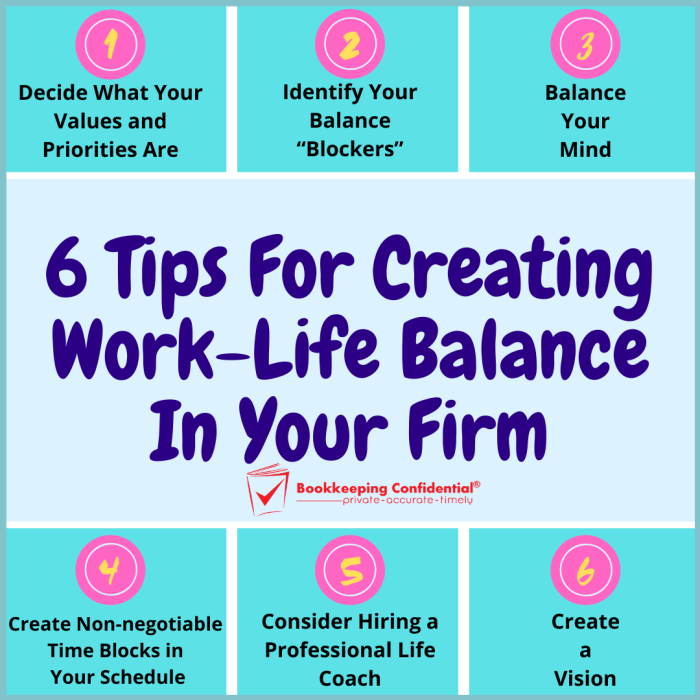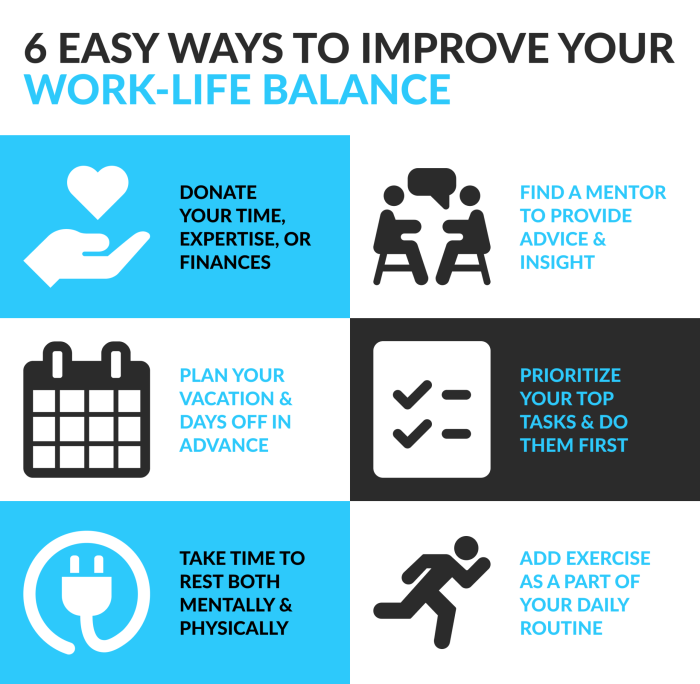Work-Life Balance Tips: Ready to level up in life? Dive into this guide for epic strategies on finding that sweet spot between work and play.
Whether you’re a hustler grinding at a 9-5 or a remote warrior navigating the digital realm, these tips got your back.
Importance of Work-Life Balance

Maintaining a work-life balance is crucial for overall well-being. It allows individuals to juggle the demands of their professional and personal lives effectively, leading to a more fulfilling and less stressful existence.
Benefits of Achieving a Good Work-Life Balance
- Improved mental health: Balancing work and personal life can reduce stress, anxiety, and burnout, leading to better overall mental well-being.
- Enhanced physical health: Avoiding overwork and dedicating time to relaxation and self-care can boost physical health and reduce the risk of illnesses.
- Increased productivity: A balanced lifestyle can result in higher productivity levels at work due to improved focus, motivation, and energy levels.
- Stronger relationships: Spending quality time with loved ones and engaging in activities outside of work can strengthen personal relationships and social connections.
Impact of Poor Work-Life Balance on Mental and Physical Health
-
Increased stress:
Failing to balance work and personal life can lead to high levels of stress, which can negatively impact mental health and overall quality of life.
-
Health problems:
Poor work-life balance has been associated with various health issues such as heart disease, obesity, and mental health disorders.
-
Decreased job satisfaction:
Employees who struggle with work-life balance often experience lower job satisfaction and higher rates of burnout.
-
Strained relationships:
Neglecting personal relationships due to work commitments can strain relationships with family and friends, leading to feelings of isolation and loneliness.
Strategies for Improving Work-Life Balance

Finding the right balance between work and personal life is crucial for overall well-being. Here are some strategies to help you achieve a healthier work-life balance:
Setting Boundaries Between Work and Personal Life
- Avoid checking work emails or messages outside of work hours.
- Designate specific times for work and personal activities to create a clear separation.
- Communicate with your employer or colleagues about your availability outside of work hours.
- Create a dedicated workspace at home to help you mentally switch between work and personal life.
Time Management Techniques
- Prioritize tasks based on urgency and importance to avoid feeling overwhelmed.
- Use tools like calendars or apps to schedule and organize your daily activities.
- Set realistic goals and deadlines to manage your time effectively.
- Delegate tasks when possible to reduce your workload and free up time for personal activities.
Importance of Self-Care Practices
- Take regular breaks throughout the day to recharge and avoid burnout.
- Engage in activities that bring you joy and relaxation, such as exercise, hobbies, or spending time with loved ones.
- Prioritize sleep and nutrition to ensure your physical and mental well-being.
- Practice mindfulness or meditation to reduce stress and increase focus.
Remote Work and Work-Life Balance: Work-Life Balance Tips
Remote work has become increasingly popular, offering flexibility and convenience for many employees. However, it can also impact work-life balance differently compared to traditional office settings. While remote work eliminates the daily commute and allows for a more customized schedule, it can blur the boundaries between work and personal life, leading to potential burnout if not managed effectively. Finding the right balance is crucial to maintaining overall well-being.
Setting Up a Productive Workspace at Home
Working from home requires a dedicated workspace that promotes productivity and separates work from leisure. Here are some tips for setting up a productive home office:
- Designate a specific area for work, ideally a quiet and well-lit space away from distractions.
- Invest in ergonomic furniture and equipment to support good posture and reduce strain on your body.
- Personalize your workspace with items that inspire and motivate you, creating a positive work environment.
- Establish a routine and stick to regular work hours to maintain structure and discipline.
Challenges and Benefits of Remote Work on Work-Life Balance, Work-Life Balance Tips
Remote work comes with its own set of challenges and benefits that can impact work-life balance. Understanding these factors is essential for effectively managing the balance between work and personal life:
- Challenges:
- Difficulty in setting boundaries between work and personal life, leading to longer work hours.
- Feelings of isolation and lack of social interaction with colleagues.
- Increased distractions at home that can affect focus and productivity.
- Benefits:
- Flexibility to create a schedule that suits your lifestyle and personal preferences.
- Elimination of commute time, allowing for more time for personal activities and family.
- Reduced stress from office politics and a more comfortable work environment.
